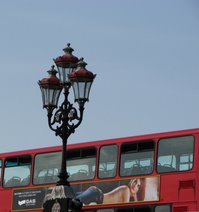I recently dusted down a book by one of my favourite authors- Thomas Hardy. I felt it time to try something a little more challenging than my recent diet of Scandinavian crime fiction. In his novel of 1872, "A Pair of Blue Eyes" he describes a character Stephen Smith coming from London, "Babylon the Second".
I tend to assume that prior to World War II, London was a truly English city but just on a big scale- rather like a huge Exeter. But this reference by Thomas Hardy is a reminder that London has long been seen as distinct from England (or indeed Britain !) There is something separate about London that means anyone visiting from the English provinces feels in many ways like a visitor to a foreign country. I remember this was how I felt when I was young and visited from the Midlands. Living in or near London for well over a decade I have forgotten this and guess I feel like an émigré to London.
However London is different from and more than an English city. It is the capital of the UK as well as of England but it is undeniably a world city that in some ways is beyond nationality.
In recent times, immigration has greatly increased this feeling but Hardy's words remind us that London has always been a kind of Babylon. In the Nineteenth century Chinese opium dens abounded in the East End. Visitors from around the Empire came and refugees from more the more revolution orientated Continent came regularly.
These days London is more like Babylon than ever. Over 300 languages are said to be spoken in London. A survey back in 1998 showed the top 40 languages spoken by London school children. These are shown below.
However London differs from Babylon is one important way. When the Tower of Babel was constructed and the Babylonians became more interested in their own achievement than worshipping God, God sent languages so that they couldn't understand each other and the building of the tower stopped.
In London today there are many different languages but so far nearly everyone understands English and therefore understands each other. If the days comes when we no longer understand each other then maybe our City will stop much like the Tower of Babel.
Languages spoken by London School Children in 1999:
English 608,500
Bengali & Sylheti 40,400
Panjabi 29,800
Gujarati 28,600
Hindi/Urdu 26,000
Turkish 15,600
Arabic 11,000
English-based Creoles 10,700
Yoruba (Nigeria) 10,400
Somali 8,300
Cantonese 6,900
Greek 6,300
Akan (Ashanti) 6,000
Portuguese 6,000
French 5,600
Spanish 5,500
Tamil (Sri Lanka) 3,700
Farsi (Persian) 3,300
Italian 2,500
Vietnamese 2,400
Igbo (Nigeria) 1,900
French-based Creoles 1,800
Tagalog (Filipino) 1,600
Kurdish 1,400
Polish 1,500* I suspect this will be significantly higher today.
Swahili 1,000
Lingala (Congo) 1,000
Albanian 900
Luganda (Uganda) 800
Ga (Ghana) 800
Tigrinya (Sudan) 800
German 800
Japanese 800
Serbian/Croatian 700
Russian 700
Hebrew 650
Korean 550
Pashto (Afghanistan) 450
Amharic (Ethiopia) 450
Sinhala (Sri Lanka) 450
Subscribe to:
Post Comments (Atom)


2 comments:
What no Mandarin ?
I am sure there is a little bit but Cantonese is more common here. I believe that is spoken in Hong Kong hence the connection with Britain. Mandarin is prevalent elsewhere in China.
Post a Comment